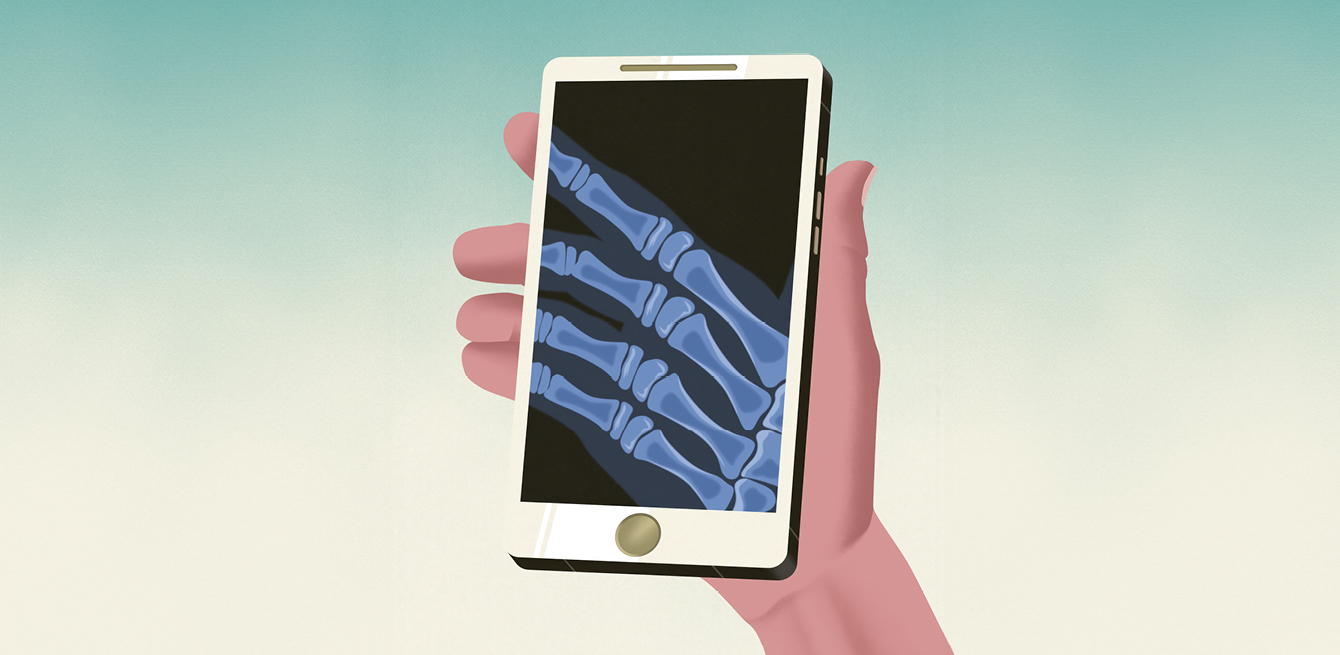
Not just wildly popular, health apps offer real help in monitoring an illness or staying in shape. Plus, they play an important role in motivation. But their data should be interpreted carefully and correctly.
When Sophie*, who has diabetes, noticed that her blood sugar was just below her ideal level before going to bed, she would routinely eat a little more, as a precaution. Why? That would raise her blood sugar to prevent any risk of hypoglycaemia, which can lead to a coma or convulsions, during the night. But now that the young mother uses AndroidAPS, that ritual is no longer necessary. The app, like FreeStyle Link and Gluci-Check, allows patients to continuously monitor their glucose.
“My diabetes started when I was pregnant. The pen injections meant constantly calculating the right insulin dose and represented a huge lifestyle change – not to mention the financial strain – especially with a baby.
So I quickly opted for an insulin pump, which I can connect to a sensor glued to my arm via AndroidAPS. The app calculates the dose to inject by itself and, to a certain extent, sends or cuts off the insulin, and I don’t have to do a thing.” By using apps like this every day, the young woman has seen her overall health improve. Her blood sugar levels, especially on an empty stomach, remain more easily within the norm, and the number of things she has to manage every day has diminished drastically.
In sports science, data collected by health apps is a valuable resource for building medical expertise, as current research has not yet been able to recreate the exact conditions experienced by athletes. “Apps collect data from massive groups of individuals, allowing us to fine-tune our understanding of the relationship between activity levels and a person’s physical condition,” says cardiologist Aaron Baggish. “The goal is to improve medical care by making it more and more personalised.”
The scientific validity of the data used in research must be guaranteed. As an example, the accuracy of the blood pressure bracelet developed by the Neuchâtel startup Aktiia – whose technology was developed by the Swiss Centre for Electronics and Microengineering (CSEM) – has been demonstrated in clinical trials at the CHUV. “So far, there haven’t really been any apps that can adequately measure blood pressure on a daily basis,” Aaron Baggish says. “The bracelet is therefore a promising tool, because the data is free from bias of a hospital or clinical context. Doctors will be able to prescribe medication or recommend possible lifestyle changes with even greater precision.”
In 2021, a study in the Journal of Medical Internet Research reported that mobile health apps made a real difference, for example, in medication adherence for people with cancer, heart disease or chronic pain. And it is not just medical apps. Non-medical applications used to manage exercise, fitness and well-being have become hugely popular in recent years, which was accentuated during the pandemic. The State of Mobile in 2022 reported an increase of more than 25% between 2019 and 2021. Home Workout - No Equipment and Mi Fit, which can be downloaded onto a connected wristband or smartphone, were the top three most downloaded applications worldwide in 2020.
More and more athletes, both professional and amateur, openly talk about using health apps within the context of a consultation. Head of the Sports Medicine Centre at Lausanne University Hospital (CHUV), Vincent Gremeaux applauds this shift. “Although apps don’t replace medical care and may not be suitable for everyone, they provide an additional tool for communication between doctors and patients. To avoid problems such as an ill-adapted programme for someone who wants to resume exercise after a long period of inactivity, or to prevent over-training for an athlete, the physician can guide the patient in choosing a programme aligned with the patient’s situation.”
Interpreting the results and a critical eye are a fundamental in ensuring that the apps are used appropriately. Chief physician at the CHUV’s Cardiology Service, Aaron Baggish regularly helps his patients understand what their data means. “Apps don’t always provide accurate information. For example, some blood pressure monitoring tools may indicate an abnormal increase or decrease during exercise.
However, this is often due to a fault in the system. It is therefore very important to distinguish between what is a real health problem from what is not, and to contact your doctor to clear up any doubts.”
The reliability and effectiveness of most health apps are not clinically or scientifically proven. A report published on the Science et Avenir website said that more than two-thirds of the 68 apps analysed had not been undergone clinical studies before market launch. To address this issue, in 2019 eHealth Suisse, the Swiss Competence and Coordination Centre of the Confederation and the Cantons, drew up a list of nine criteria to help healthcare professionals and patients to identify apps relevant to their needs. “It remains difficult to assess, especially as these apps are changing all the time. We need to think about a more global solution in the future,” Vincent Gremeaux says. Many doctors don’t know how to integrate these tools into their practice. “My hope would be to develop a programme to teach doctors how to use this data,” Aaron Baggish says.
A lack of clinical studies does not always mean ineffective. “Apps can play an extraordinary role in motivating and encouraging patients to achieve their goals,” the expert says. “There’s nothing like visualising your progress on a bar chart. The fact that an application was created by a sports science professional or a doctor and that it has an educational aspect can also be quality factors.” Aaron Baggish also recommends setting clear and specific goals, which then need to be “translated” in the app. “Walking for two and a half hours at a brisk or moderate pace does not involve the same effort. That needs to be written into your goals.”
“To guarantee at least some measure of security, I installed the app on a second phone, which I left in aeroplane mode most of the time,” Sophie says. “At times I’ve been afraid that my app would be hacked and someone could do something like inject me with insulin remotely.” Olivier Crochat, Executive Director of the Center for Digital Trust at the EPFL, believes that for now cyber-criminals are not interested in hacking health or fitness data. “It’s difficult to work out how to blackmail people over, for example, the number of steps you take in a day. The risk of being profiled is much higher.” To guarantee your cybersecurity, the digital trust expert recommends choosing applications developed by a local company. Although Switzerland and Europe have strong legislation that protect personal data, Olivier Crochat stresses the ambivalent purposes of metadata. “More and more employers are encouraging people to download wellness or fitness apps. Even if the employee decides not to share this data, simply regularly connecting to an app to combat depression, for example, already provides valuable information about the person.”
Some insurance companies, such as Helsana or CSS use apps developed by a German company to reward policyholders who favour a healthy lifestyle and improve prevention. “The question is where to draw the line between a well-intentioned incentive and a way of filtering policyholders to penalise anyone classified as a poor performer,” the expert concludes. /
* Not her real name

Aaron Baggish, cardiologist at the CHUV, believes that physicians can help detect some of the inaccurate information provided by health apps.